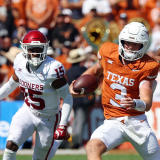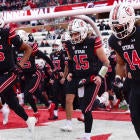Power Five commissioners announced Thursday what they called "an agreement in concept" to give college athletes more time off from their sports.
How much time athletes spend practicing and playing has been a source of debate given that they typically exceed the NCAA's rule of 20 countable athletically related activities per week. Many athletes have said in surveys they spend 40-50 hours a week on their sport. The proposal comes as the NCAA continues to defend its amateurism model in court based on the association's stated educational mission.
In a joint statement, the SEC, ACC, Big Ten, Pac-12 and Big 12 said they agree on giving athletes at least an additional 21 days off during an academic year where they're free of required athletic activities. The Power Five are calling this concept "Flex 21," and it would be in addition to current NCAA rules related to time off.
"Recognizing that every sport has different needs, the proposal includes flexibility so coaches, students and athletic directors can come up with a plan that best suits each sport," the five commissioners said in a statement.
Other proposed concepts include:
- No required athletic activities for athletes for at least one week after a season ends. Exceptions would be allowed if an athlete is training for an elite national or international event.
- At least 14 additional days during the academic year with no required athletic activity so athletes can participate in other college activities. The off-days could occur during the season or outside the season but must be taken during the academic year.
- Every athlete getting at least one day a week off from sports, including travel, during the season. Teams can currently use travel days to meet their one-day off NCAA requirement. "The new proposal would recognize that individual circumstances may require a flexible approach in the application of this proposal, but it is intended to provide student-athletes with more time away from athletic activities (e.g., travel days, etc.)," the commissioners said.
- At least eight straight hours of free time overnight, between 9 p.m. and 6 a.m. So, if a team scheduled a 6 a.m. workout, all required athletic activities would have to end by 10 p.m. the night before.
The proposed concepts are a rare instance lately in which the Power Five conferences have coordinated their ideas through NCAA autonomy. They said formal proposals will have to be submitted to the NCAA later for consideration at the NCAA convention next January. The Power Five statement said each conference "retains the right to pursue additional changes if they see fit."
















